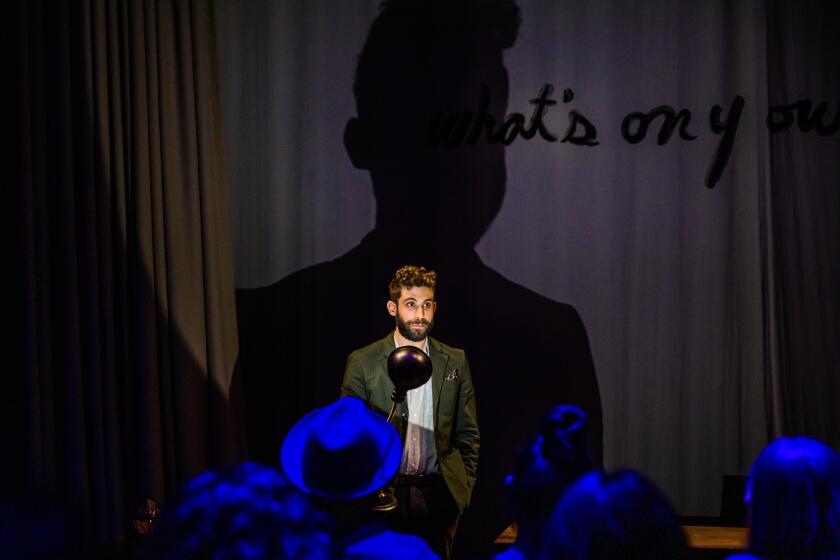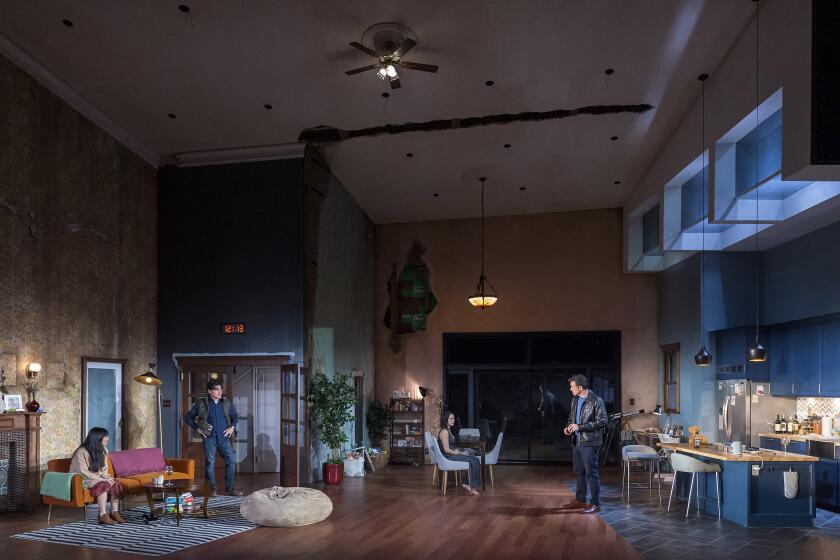Good vs. evil in a sandwich shop: Why ‘Clyde’s’ is a delicious bite of L.A. theater
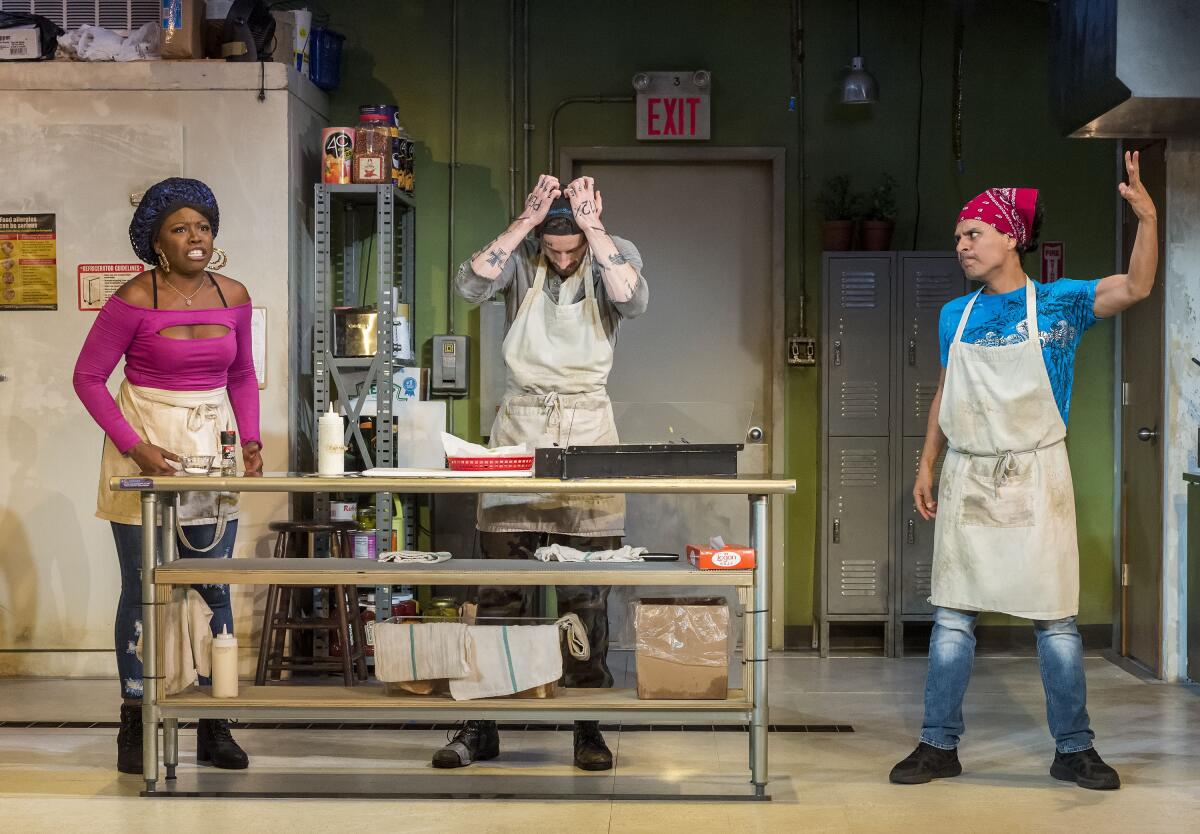
- Share via
“If you can’t stand the heat, get out of the kitchen,” advises a favorite proverb of tough-love advocates. And in a universe with free will and infinite possibilities, it’s probably sound advice. Don’t sit around grousing about your situation; find one you like better.
But what if there’s nowhere else to go? What if that inferno of a kitchen is your whole world?
This is the predicament of the kitchen staff at Clyde’s, the truck stop sandwich shop setting for Lynn Nottage’s 2021 Tony-nominated, playful, provocative dark comedy, “Clyde’s,” now at the Mark Taper Forum. The greasy spoon’s sandwiches are unexpectedly delicious, but as a workplace, it’s not healthy; in fact its toxicity is operatic in scope.
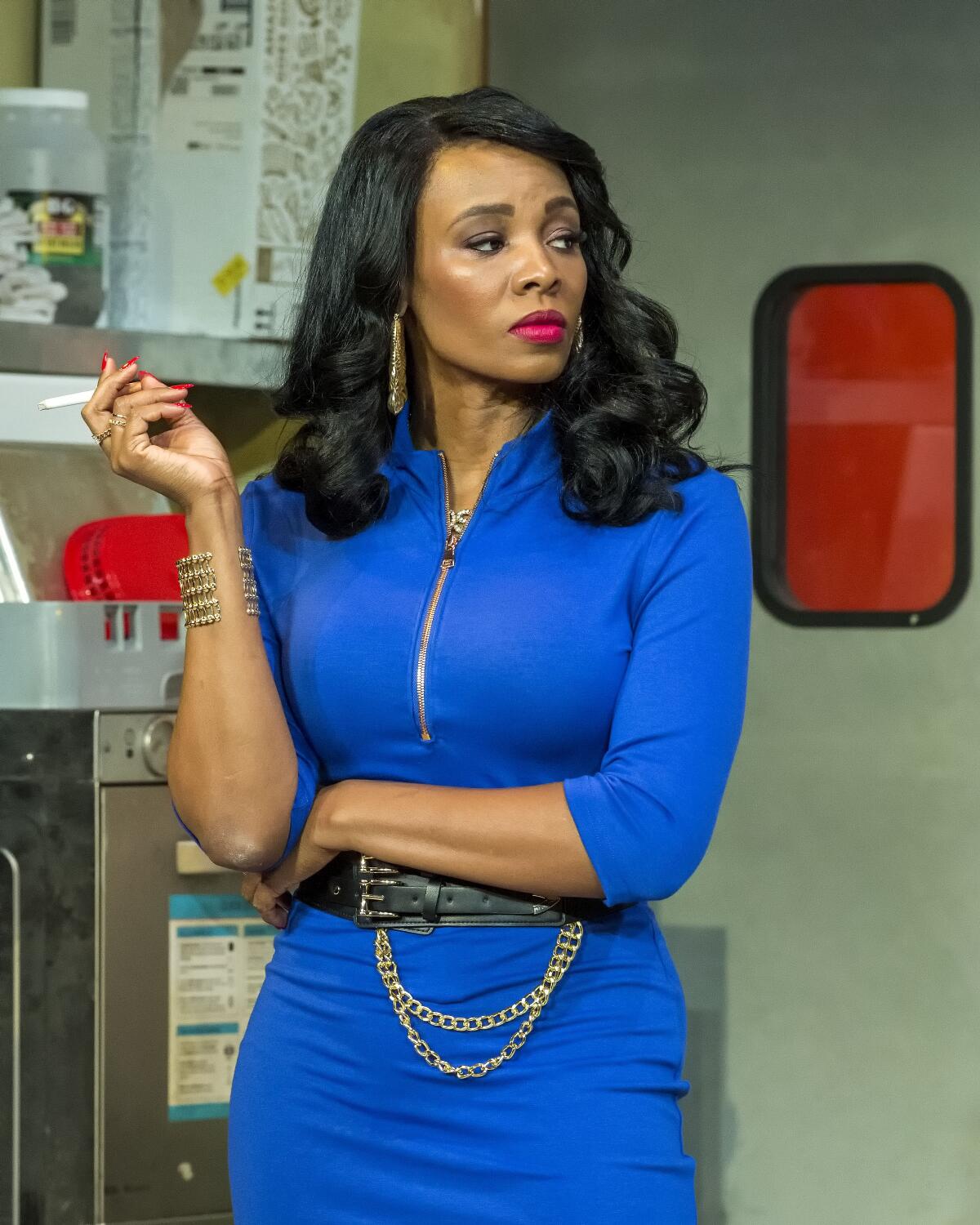
The boss, Clyde (the galvanic Tamberla Perry), is a larger-than-life, terrifyingly glamorous villainess in an ever-changing carapace of Lycra and leather haute couture. She loves frightening, belittling, sexually harassing and shaming her employees. Anyone who has ever had to work for a charismatic bully will recognize the storm of terror, supplication and idolatry Clyde provokes every time she appears in the kitchen with a new chic wig and gleaming stilettos.
So why not just quit? One obstacle is that all these workers have recently been released from prison, so no one else will hire them. Clyde, who herself has served time, is the rare businesswoman willing to give ex-cons a shot. She could be seen as a humanitarian, except that in taking on parolees she essentially makes herself their new warden, entitled to punish or pet them as the whim strikes her. They’ve escaped one prison for another.
The story takes place near the same blighted Rust Belt town — Reading, Pa. — where Nottage’s 2017 Pulitzer Prize-winning drama “Sweat” is set. In researching “Sweat,” in which a union-management standoff causes a close-knit group of steelworkers to fracture along racial lines, Nottage spent several years visiting Reading and interviewing its residents. “Clyde’s” also was inspired by some of their stories, and the two plays even share a character: Jason (played here by Garrett Young), the well-meaning but insecure young man who commits a brutal assault in “Sweat” and then, in prison, succumbs to white supremacist rhetoric.
Created and performed by theater artist and mentalist Vinny DePonto, ‘Mindplay’ probes the unreliable narrators of our minds in a Geffen Playhouse world premiere.
But Jason is a fish out of water in “Clyde’s,” more stooge than menace. When he shows up fresh out of prison for his first shift, his new co-workers aren’t pleased to meet him. Letitia (or Tish, played by the endearing Nedra Snipes), the Black single mother of a special-needs child, and Rafael (the hammy but winsome Reza Salazar, who originated the role of a Latino recovering addict) not only find Jason’s gang tattoos offputting, but also are protective of their turf and their hard-won expertise.
And while Jason thinks he’s there to make sandwiches, Tish and Rafael have a far loftier attitude toward their jobs. They’ve fallen under the sway of veteran employee Montrellous (the serene Kevin Kenerly), who presents sandwich making as a holy art form and himself as its high priest. The three of them playfully compete to come up with the perfect recipe. Montrellous always wins with entries such as “Maine lobster, potato roll gently toasted and buttered with roasted garlic, paprika and cracked pepper and truffle mayo, caramelized fennel and a sprinkle … of … dill.” Jason thinks they’re crazy — until he tastes one of Montrellous’ grilled cheese masterpieces. Next thing he knows, he’s fantasizing about flavor pairings and garnishes.
None of this sits well with Clyde, who has no interest in turning her restaurant into a foodie destination and whose real business may be laundering money for her mysterious offstage “investors.”
As this summary may suggest, despite being drawn from the same well, “Sweat” and “Clyde’s” are very different in tone. Whereas “Sweat” is a heartbreaking social issue drama, ”Clyde’s” has the unthreatening zing of a sitcom. Like sitcom employees, the Clyde’s cooks complain about how busy they are, and they look busy, smacking cleavers through heads of lettuce, slapping turkey slices onto waxed paper, and lavishly squeezing sauces all over them. But their efforts produce noticeably few sandwiches. For people who insist that “we don’t have time for socializing,” they do an awful lot of it — growing as characters, falling in and out of love, resisting and succumbing to temptation. So, is Nottage trying to follow in the footsteps of Tracy Letts, whose Broadway play “Superior Donuts,” roundly described as sitcommy, was actually adapted into a CBS series?
For the record:
6:06 p.m. Nov. 23, 2022Earlier versions of this review incorrectly stated where the production originated. It began at Second Stage Theater in New York.
Although this production, which premiered at the Second Stage Theater in New York, has elements of both “Waiting for Lefty” and the 1970s CBS series “Alice,” at heart it’s an existential parable in the tradition of “No Exit” (but more upbeat, and with sandwiches). In Kate Whoriskey’s vibrantly theatrical staging, Clyde’s looks like a grungy restaurant (the persuasive set is by Takeshi Kata) but it’s really an allegorical space, a philosophical arena for the age-old struggle between good and evil. Tish, Rafael and Jason are pilgrims on a quest for meaning and beauty in a craven world, forced to choose between self-preservation and self-expression.
The play’s U.S. premiere brings the horror, but wastes the talents of Constance Wu, Finn Wittrock, Anna Camp and Adam Rothenberg on creaky characters.
Clyde insists that they churn out the lowest-quality sandwiches her patrons will tolerate; Montrellous inspires them to chase an aesthetic ideal without concern for market appeal. The conflict between the magnitude of what’s at stake (hope, redemption, the nobility of the human spirit) and the mundanity of the medium (turkey, mayo) is the source of the play’s tongue-in-cheek humor. The climactic showdown actually involves pickle relish.
Nottage’s dialogue bristles with hints of the archetypes that she has woven into her unglamorous setting: “She’ll make you pay in blood,” Tish warns of Clyde. “She might actually be the devil,” Jason ventures. Rafael describes Clyde’s sinister investors as sharks from down South. “They are from the underworld,” he adds. “I looked into this one dude’s eyes, and it was like staring into the abyss.”
Montrellous, in contrast, is almost comically saintly. When it’s his turn to disclose why he went to prison, his story is so noble that Jason cries out, “How the … are we supposed to live with ourselves? I feel inadequate in your presence.”
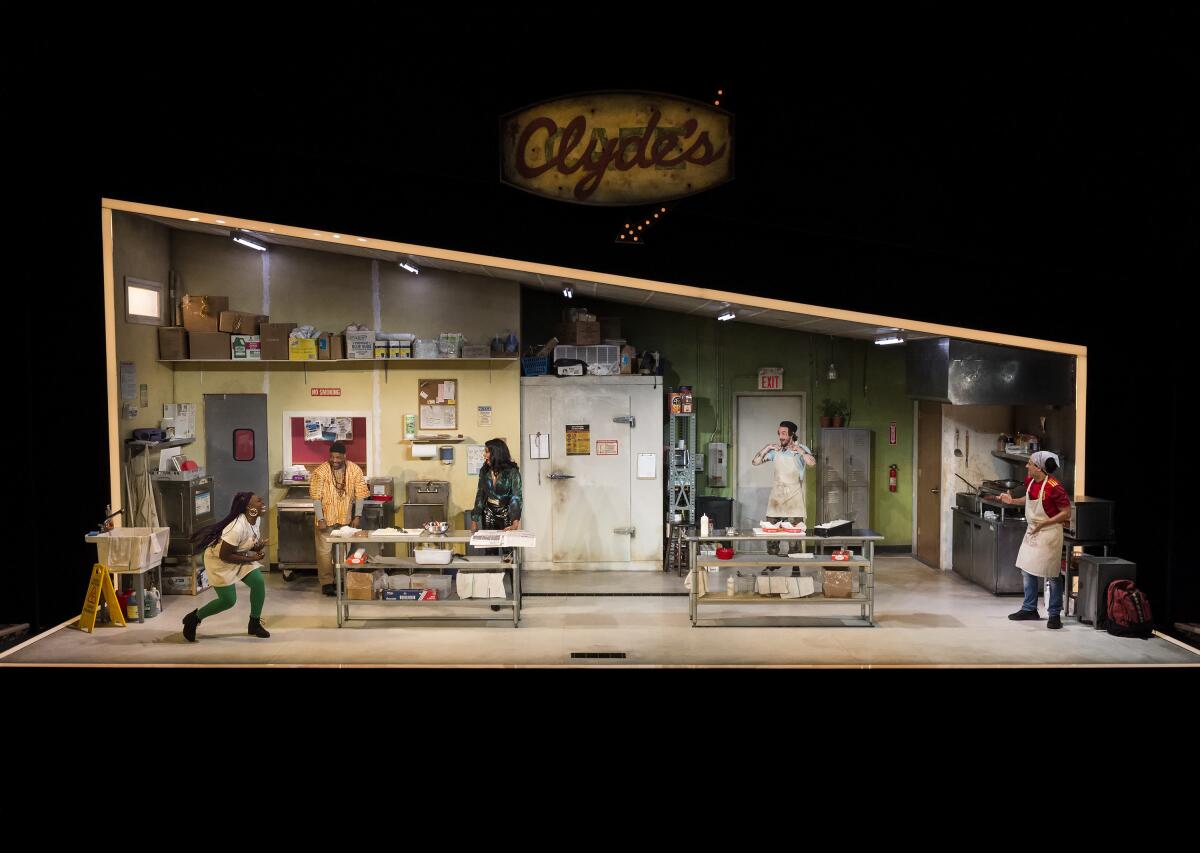
Whoriskey and her designers have played up these eschatological hints with bold surrealistic touches. Every time Montrellous launches into one of his inspirational monologues, lighting designer Christopher Akerlind bathes him in a warm glow while Justin Ellington contributes a reverent soundtrack. Clyde’s outfits, designed with delicious panache by Jennifer Moeller, get more and more devilish with each scene, until at last Clyde is sheathed in skin-tight bright red leather. At some moments, in case we didn’t get the references, the stage erupts in flames.
This bold combination of dramatic precedents has a lot in common with Montrellous’ philosophy of sandwich making. “What I find is that you‘ve got to surprise yourself with an ingredient that shouldn’t work, something that pulls it all together,” he muses. “Think about the challenging flavor that’s going to defy expectation, and elevate your sandwich.” It’s obvious he’s talking about more than sandwiches. Come to think of it, writing a play is a bit like preparing a sandwich: choosing ingredients that appeal to a broad range of consumers without selling your soul. Mixing in just enough humor and optimism to offset the bitterness of your vision without turning it too sweet.
When Jason designs his first sandwich, Montrellous is critical: “You want it to do too much, and didn’t trust yourself with the ingredients. … Pull back. Overcomplication obscures the truth.” Some people might react similarly to “Clyde’s” — and that’s sort of the point. Even in the sweltering kitchen where we all have to live (because there are no other rooms in the house), we can find opportunities to create something meaningful together. Or at least give each other something to chew on.
'Clyde’s’'
Where: Center Theatre Group’s Mark Taper Forum, 135 N. Grand Ave., L.A.
When: 8 p.m. Tuesdays-Fridays, 2:30 and 8 p.m. Saturdays, 1 and 6:30 p.m. Sundays. Ends Dec. 18. (Call for exceptions.)
Tickets: $35-$120 (subject to change)
Info: (213) 628-2772 or centertheatregroup.org
Running time: 1 hour, 30 minutes, with no intermission
COVID protocol: Masks are strongly recommended.
More to Read
The biggest entertainment stories
Get our big stories about Hollywood, film, television, music, arts, culture and more right in your inbox as soon as they publish.
You may occasionally receive promotional content from the Los Angeles Times.
